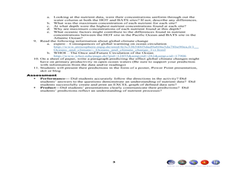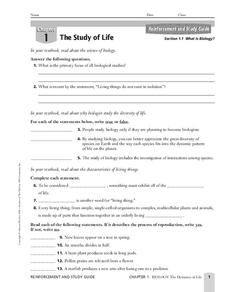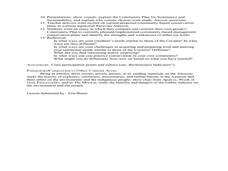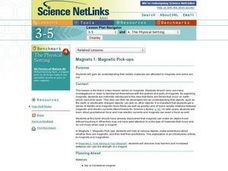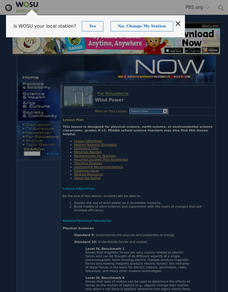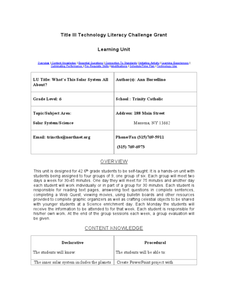Curated OER
You're As Old As Ice!
High schoolers study glaciers and their terminology. In this investigative lesson students get into groups and watch the life cycle of a glacier on a web site then answer questions. They will then use play dough to show how glaciers...
Curated OER
How Temperature Affects Density
Students examine the effects of temperature and density in ocean currents. In this density lesson, students explain how coastal climates are impacted by ocean currents. They investigate how the ocean currents are affected by temperature...
Curated OER
Career Exploration
Students create a pamphlet, brochure, handout, or poster about a career in the marine sciences. In this marine science lesson plan, students use the Internet to research a marine science career. They create a printed media item to share...
Curated OER
Bats and Hot Dogs
Students identify patterns and relationships from data that is collected and solve variables. In this investigative lesson students study ocean productivity, the nitrogen cycle and phytoplankton then answer questions.
Virginia Department of Education
Succession
The final lesson in a two-part series prompts scholars to create newspaper articles and succession events. Applying their knowledge of the ecosystem and the past examples of succession, they predict what will happen in the future using...
Curated OER
The Nitrogen Cycle
Fifth graders investigate the nitrogen cycle and examine the concepts of decomposition and nitrification. Students participate in a class discussion about the creation of waste and ammonia compounds, then using nitrogen cycle cut-outs...
Curated OER
Agents of Erosion
Fourth graders explore the agents of erosion. They observe rocks that are rough and unweathered and record observations. They investigate rocks rubbed with sandpaper and ones that are not and the effects that the sandpaper has on the...
Curated OER
What is Biology?
In this science of biology worksheet, students will review the concepts relating to biology including the characteristics of living things, the process of reproduction, adaptations, and evolution. This worksheet has 5 short answer, 3...
Curated OER
Let's Make a Plan
Students investigate pollution reduction policies in place at their school. In this pollution reduction lesson, students interview people in their school to determine what pollution policies are in place. They create a plan to increase...
Curated OER
Navigation By the North Star: A Lesson Plan in Four Parts
Students investigate why the North Star was important for navigation, how stars move across the night sky, how to locate the North Star, how to make a crude sextant, and how to determine latitude using a sextant and the North Star. They...
Curated OER
Supermarkets, Sustenance and Sustainability
Students investigate jungles and the people who depend upon them. In this sustainability lesson, students research wild life conservation and discover the importance of a jungle to Amazonian people. Students create a group presentation...
Curated OER
Student Tracking
Here is an interesting lesson on satellite tracking. Learners use various tracking techniques to find out where they go on a daily basis, what the environmental conditions are, and what they are doing during their "migrations." A...
Space Awareness
What is Time?
Does it ever seem like time is slipping through your fingers? Model the passing of time with an hourglass activity in which individuals determine whether hourglasses are the most efficient way to measure time.
Science Matters
Earthquake Preparedness
Forty-five states and territories in the USA are at moderate to very high risk of earthquakes. The discussion-based lesson covers what to do before, during, and after an earthquake. The 14th lesson in the series includes how to prepare a...
Statistics Education Web
Are Female Hurricanes Deadlier than Male Hurricanes?
The battle of the sexes? Scholars first examine data on hurricane-related deaths and create graphical displays. They then use the data and displays to consider whether hurricanes with female names result in more deaths than hurricanes...
Curated OER
Magnetic Pick-ups
Students gain an understanding that certain materials are attracted to magnets and some are not.
Curated OER
How Strong is Your Magnet?
Students measure the strength of a magnet and graph how the strength changes as the distance from the magnet increases.
Curated OER
Science: Wind Power
Students build models of wind turbines and experiment with different designs that will improve efficiency. Students will understand the use of wind power as a renewable resource.
Curated OER
What's This Solar System All About?
Sixth graders complete a unit of lessons on the solar system. In small groups, they participate in a Webquest, watch movies, complete graphic organizers, and answer questions, create a model of the planets, and develop a Powerpoint...
Curated OER
The Fault Line
Students use cardboard models of the North American and Pacific plates and sand to investigate what happens when there is an earthquake or movement along the boundaries of the plates.
Curated OER
Ice Core Clues
Students create a PowerPoint presentation on the information they research about the ice cores and what they tell us about Earth's past. In this ice core lesson plan, students research radioactivity, air pollution, sodium, snowfall...
Curated OER
How Islands Form
Pupils how islands form, rising water levels, growth of coral, and volcanoes. They complete Island Investigation worksheets after researching island formation on various Internet websites.
Curated OER
Reflection and Absorption of Light
Students use a microcomputer connected to a light sensor and temperature probe to explore the reflection and absorption of radiation for different surfaces. Students follow instructions in this guided inquiry based lab and are then asked...
Curated OER
Mighty Minerals-We Use Them Everyday
Third graders investigate the importance of knowing about rocks and minerals. They study the way in which many products are produced from rocks and minerals. Students are shown how we obtain many of the rocks and minerals we use.





